|
|
|
Sort Order |
|
|
|
Items / Page
|
|
|
|
|
|
|
| Srl | Item |
| 1 |
ID:
142544
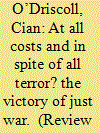

|
|
|
|
|
| Summary/Abstract |
Derived from the Latin Victoria, which itself can be traced to vino victus, meaning ‘to conquer’, victory evokes a number of close synonyms, principally conquest and triumph. It occupies an ambivalent position in respect of contemporary war. Though in some regards a concept that is essential to the very idea of combat, the notion of winning wars has acquired an ironic ring in the aftermath of two brutal world wars and the advent of nuclear weapons. Victory in war is clearly a contentious subject. Yet scholars of the just war tradition have largely ignored it. This article fills that breach by asking what, if anything, victory can mean in relation to just war? It argues that victory has an aporetic quality insofar as it appears both integral to but incompatible with the just war ethos. As such, it reveals both the limits and possibilities of just war thinking.
|
|
|
|
|
|
|
|
|
|
|
|
|
|
|
|
| 2 |
ID:
106453


|
|
|
|
|
| Publication |
2011.
|
| Summary/Abstract |
This article argues that most analyses of the Kargil conflict concede the important role played by the United States in understanding how India regained control of the Kargil heights, but fail to explain how India's intra-war compellent threat forced Washington to bring irresistible pressure to bear on Islamabad. The Indian decision to threaten asymmetrical escalation was the result of domestic pressures and military difficulties facing the Vajpayee-led caretaker government. The article shows that Washington pursued an "impartially" interventionist strategy until it came under Indian pressure to forsake its "balanced" approach towards ending the conflict. The article also shows how the "asymmetry of motivation" between New Delhi and Washington was an important factor in terminating hostilities in India's favor.
|
|
|
|
|
|
|
|
|
|
|
|
|
|
|
|
| 3 |
ID:
087821
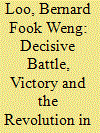

|
|
|
|
|
| Publication |
2009.
|
| Summary/Abstract |
This article examines the notion of so-called decisive victory, and the apparent relationship between battlefield victory and strategic success. It argues that there is no necessary causal relationship between what happens on the battlefield and the eventual outcomes of wars. It further argues that the Revolution in Military Affairs, because it appears to render battlefield success so much more attainable, further complicates muddled strategic thinking on these issues, and may actually be counter-productive to strategic success.
|
|
|
|
|
|
|
|
|
|
|
|
|
|
|
|
| 4 |
ID:
174518
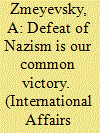

|
|
|
| 5 |
ID:
123603
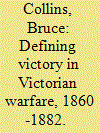

|
|
|
|
|
| Publication |
2013.
|
| Summary/Abstract |
The British launched numerous punitive expeditions in the decades before the international scramble for Africa. Often portrayed as 'wars against nature', such campaigns in fact posed considerable challenges, not least because they were conducted to tight deadlines and were expected to result in low-cost victories. Yet it was often difficult to define clear military objectives. This article explores punitive expeditions' demands upon their commanders and the ways in which commanders found suitable culminating points, in the absence of decisive battles, when victory might be declared and celebrated. Victory had to be defined for the intervening army, for the people and leaders of the country being attacked, and for politicians and the public at home. Defining victory was thus a complex process, reflecting the range of military, political and public pressures upon commanders.
|
|
|
|
|
|
|
|
|
|
|
|
|
|
|
|
| 6 |
ID:
171644
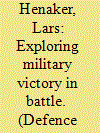

|
|
|
|
|
| Summary/Abstract |
This study examines simulated battle settings, to analyze how tactics are performed and victory is achieved by observing tacticians dueling in wargames. In contemporary warfare, victory in battle relates to a wide variety of elements. According to military theory, these elements commonly involve deployment, reconnaissance, manoeuvre, breakthrough, tempo, surprise, exploitation, and shock, resulting in enemy organizational breakdown. Ideally, if one side in combat exploits all elements successfully, the likelihood of victory increases. Although the use of the tactical elements is not always obvious to the participants, the study indicates a correlation between using the elements and victory in a wargame setting. Although wargames inherent bias by not being the real world, they are used in training, education and analysis worldwide. The study also illustrates that the participants view tactical victory differently in battle.
|
|
|
|
|
|
|
|
|
|
|
|
|
|
|
|
| 7 |
ID:
094704
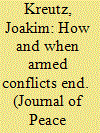

|
|
|
|
|
| Publication |
2010.
|
| Summary/Abstract |
This article presents new data on the start and end dates and the means of termination for armed conflicts, 1946-2005. These data contribute to quantitative research on conflict resolution and recurrence in three important respects: the data cover both interstate and intrastate armed conflicts, the data cover low-intensity conflicts, and the data provide information on a broad range of termination outcomes. In order to disaggregate the UCDP-PRIO Armed Conflict dataset into multiple analytical units, this dataset introduces the concept of conflict episodes, defined as years of continuous use of armed force in a conflict. Using these data, general trends and patterns are presented, showing that conflicts do not exclusively end with decisive outcomes such as victory or peace agreement but more often under unclear circumstances where fighting simply ceases. This pattern is consistent across different types of conflict, as is the finding that victories are more common in conflicts with short duration. The article then examines some factors that have been found to predict civil war recurrence and explores whether using the new dataset produces similar results. This exercise offers a number of interesting new insights and finds that the determinants for civil war recurrence identified in previous research are sensitive to alternate formulations of conflict termination data. The findings suggest that intrastate conflicts are less likely to recur after government victories or after the deployment of peacekeepers. If the previous conflict is fought with rebels aiming for total control over government or if the belligerents mobilized along ethnic lines, the risk of recurrence increases. The discrepancy in findings with previous research indicates the need for further study of conflict resolution and recurrence, for which this dataset will be useful.
|
|
|
|
|
|
|
|
|
|
|
|
|
|
|
|
| 8 |
ID:
087288
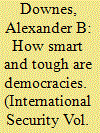

|
|
|
|
|
| Publication |
2009.
|
| Summary/Abstract |
Proponents of the selection effects argument claim that because democratic leaders run a higher risk of losing office than autocratic leaders if they fail to win wars, they are more careful than their authoritarian counterparts in choosing which wars to initiate. The robust marketplace of ideas in democracies also weeds out self-serving or ill-conceived policies and allows democratic leaders to better estimate the chances of victory. Democracies, according to this logic, tend to pick on weak or vulnerable opponents and thus win a disproportionate number of the wars they start. Both quantitative and qualitative evidence, however, challenges this conclusion. The statistical correlation between democracy and victory is not robust to reasonable alternative choices for analyzing the data. In particular, including draws as a war outcome renders statistically insignificant the finding that democratic initiators and targets are more likely to win. In addition, democratic leaders who initiate wars should be optimistic that they will win, but process tracing of the decision by Lyndon Johnson's administration to escalate the Vietnam War (one of these omitted draws) reveals that top officials knew at the time that escalation promised a costly, protracted stalemate, yet they chose to fight anyway. Moreover, domestic politics, if anything, contributed to Johnson's decision to fight in Vietnam despite the poor odds of victory because he believed that pulling out would spark a backlash and destroy his Great Society legislative program.
|
|
|
|
|
|
|
|
|
|
|
|
|
|
|
|
| 9 |
ID:
188926
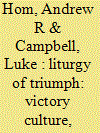

|
|
|
|
|
| Summary/Abstract |
Wartime is fundamentally important to the study of international politics but not especially well understood. In this paper, we use timing theory and the concept of liturgy to unpack the contemporary dynamics of US wartime. A theory of political timing posits that all temporalities derive from and symbolize underlying social processes, and that these timing efforts unfold according to a master organizing standard. Liturgy highlights the way that ritualized acts help participants commune with the sacred – whether this be God or the nation-state. Scrutinizing contemporary US culture practices, we combine these ideas to argue that the notion of victory, as enacted through a widespread set of performative routines, acts as an organizing standard that embeds and reifies wartime in US security policy and daily life. Prevalent ideals of winning wars gather together a stylized past, explicate present problems, and generate expectations about future problems and conflicts. We tabulate several highly influential examples of this liturgy of triumph from national calendars, commemorative sites and events, and cultural practices like spectator sports. In addition to normalizing a view of wartime as having clear beginnings and uniquely successful endings, the US liturgy of triumph highlights a growing gap in the country’s relationship to the use of force. Most of what performative war liturgies commemorate is ‘finished’; it has been seen, known, and ostensibly won. Yet, much of what defines 21st century conflict is anything but certain or victorious. Moreover, US victory culture has only grown more acute the longer the concrete victories fail to materialize, suggesting a tragic code at the heart of US security politics.
|
|
|
|
|
|
|
|
|
|
|
|
|
|
|
|
| 10 |
ID:
165116


|
|
|
|
|
| Summary/Abstract |
The literature on peacebuilding has increasingly emphasized the importance of the local level – a trend that has been called the local turn. For some researchers, the local turn can improve international peacebuilding interventions, while for others it is an agenda to promote an emancipatory and legitimate peace. There is however mixed evidence backing the argument that addressing local level issues in peacebuilding can make a substantial difference. The local turn reposes on assumptions that appear particularly problematic in an environment characterized by the lack of an elite-level pact, such as a conflict terminated in a military victory. Looking at the crisis in Côte d'Ivoire, which terminated in 2011 with the defeat of former president Laurent Gbagbo, this article highlights how the lack of elite level reconciliation compromises the effectiveness of actions aiming to promote local ‘social cohesion’. It also shows how the discourse and practices of the local turn can be appropriated by semi-authoritarian post-conflict governments in order to depoliticize the peacebuilding process. It concludes that the popularity of the ‘local turn’ among peacebuilders might be due more to the opportunity that it offers to eschew delicate national-level political issues, than to its supposed emancipatory potential.
|
|
|
|
|
|
|
|
|
|
|
|
|
|
|
|
| 11 |
ID:
147803
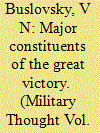

|
|
|
|
|
| Summary/Abstract |
The paper highlights the most important constituents of the Soviet people's victory in the Great Patriotic War, and shows the decisive role of the Soviet Union in defeating fascism.
|
|
|
|
|
|
|
|
|
|
|
|
|
|
|
|
| 12 |
ID:
169104
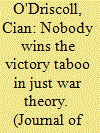

|
|
|
|
|
| Summary/Abstract |
This article examines how scholars of the just war tradition think about the ethical dilemmas that arise in the endgame phase of modern warfare. In particular, it focuses upon their reticence to engage the idiom of ‘victory’. Why, it asks, have scholars been so reluctant to talk about what it means to ‘win’ a just war? It contends that, while just war scholars may have good reason to be sceptical about ‘victory’, engaging it would grant them a more direct view of the critical potentialities, but also the limitations, of just war reasoning.
|
|
|
|
|
|
|
|
|
|
|
|
|
|
|
|
| 13 |
ID:
137556
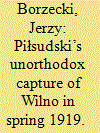

|
|
|
|
|
| Summary/Abstract |
ontrary to what some authors assert, the idea of ‘liberating’ Wilno from the Soviets did have the support of Polish political and military circles. What evoked reservations was merely Piłsudski’s execution of this idea. His Wilno operation was controversial from a military standpoint and its timing questionable, politically and militarily. It put Poland and its leader at significant risk. While ultimately Piłsudski was vindicated by a brilliant victory, it resulted in no small measure from good fortune.
|
|
|
|
|
|
|
|
|
|
|
|
|
|
|
|
| 14 |
ID:
141956
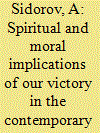

|
|
|
| 15 |
ID:
128779
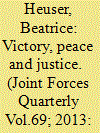

|
|
|
| 16 |
ID:
141143
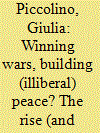

|
|
|
|
|
| Summary/Abstract |
The literature on peacebuilding dedicates very little space, empirically and theoretically, to countries that are emerging from a war waged to a decisive outcome. This review essay looks at Sri Lanka and Rwanda, two countries where a victorious leadership has led the process of post-conflict reconstruction, largely by employing illiberal means. It looks at the effect of decisive war on statebuilding and at the role of local agency and illiberal practices in a post-victory context. It concludes by assessing the global significance and long-term sustainability of post-victory illiberal statebuilding.
|
|
|
|
|
|
|
|
|
|
|
|
|
|
|
|
| 17 |
ID:
087449
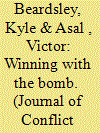

|
|
|
|
|
| Publication |
2009.
|
| Summary/Abstract |
Nuclear weapons' effects on an actor's success in coercive diplomacy are in part a function of how nuclear weapons change the perceived costs of conflict. The authors argue that states can improve their allotment of a good or convince an opponent to back down and have shorter crises if their opponents have greater expected costs of crisis. Noting that nuclear weapons increase the costs of full-escalation scenarios but decrease their probability, it is uncertain what impact nuclear weapons should have on expected costs of conflict. The authors assess crisis outcomes from 1945 to 2000 using the International Crisis Behavior data set. The evidence confirms that nuclear actors are more likely to prevail when facing a nonnuclear state. The expected duration of crisis in such asymmetric directed dyads is substantially smaller than the duration of crisis for actors in nonnuclear dyads. Nuclear actors in asymmetric dyads are also more likely to prevail than states in symmetric nuclear dyads.
|
|
|
|
|
|
|
|
|
|
|
|
|
|
|
|
| 18 |
ID:
121850
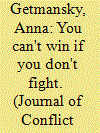

|
|
|
|
|
| Publication |
2013.
|
| Summary/Abstract |
What effect, if any, does democracy have on outcomes of counterinsurgency wars? Previous studies have provided inconclusive answers mainly because of the challenges involved in testing the question empirically: First, insurgencies are not accidental and the anticipated outcomes also affect whether they break out in the first place. Second, regimes are non-random and their determinants can also affect insurgency incidence and its outcomes. Moreover, different aspects of democracy can have opposite effects on the government's chances of winning. I address these challenges by conducting a critical test to distinguish between different causal mechanisms. I find that domestic institutions that are associated with public goods provision make insurgency onsets less likely. I also show that once we control for this selection effect, domestic political institutions do not influence insurgency outcomes.
|
|
|
|
|
|
|
|
|
|
|
|
|
|
|
|
|
|
|
|
|